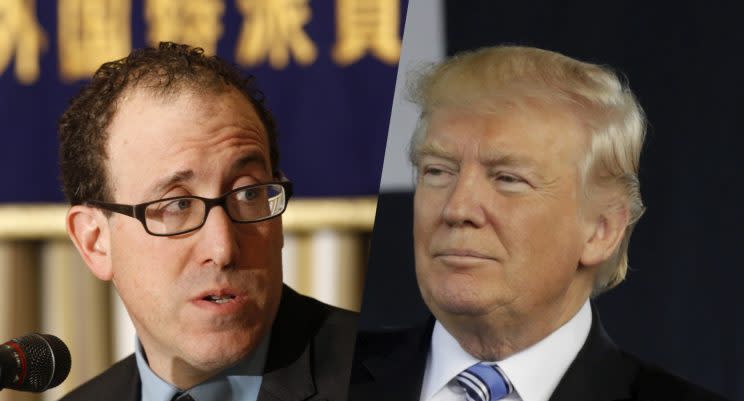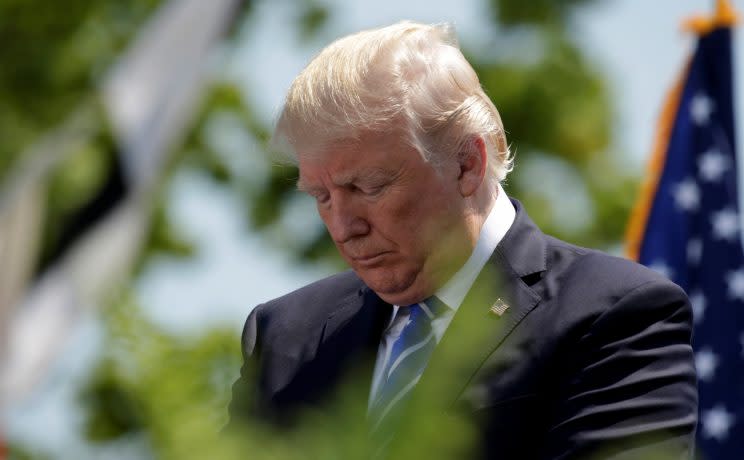The Comey memo was also about Trump’s request to arrest reporters. Journalists call it ‘crazy and scary.’
Journalists are accustomed to President Trump’s contempt for the press by this point, but his apparent desire to jail reporters who publish classified information still sent shockwaves through the profession.
The New York Times published a story with details from a memo written by former FBI Director James Comey about a meeting he had with Trump in February. Although the memo has mostly generated controversy for Trump’s reported attempt to squelch an investigation of former National Security Adviser Michael Flynn, the president also reportedly asked Comey to bring charges against journalists who publish classified information:
“Alone in the Oval Office, Mr. Trump began the discussion by condemning leaks to the news media, saying that Mr. Comey should consider putting reporters in prison for publishing classified information, according to one of Mr. Comey’s associates.”
Yahoo News reached out to the Committee to Protect Journalists (CPJ), an independent nonprofit dedicated to defending the rights of journalists around the world, for reaction to Trump’s reported desire to jail journalists.
Joel Simon, who has been the executive director of the CPJ since 2006, has led the organization’s efforts to protect press freedom in the digital space. He helped establish the CPJ’s Global Campaign Against Impunity and Journalist Assistance program.
He spoke to Yahoo News about how Trump’s latest comments differ from his anti-media campaign rhetoric, and what they mean for the state of journalism.

Yahoo News: As somebody who’s committed to protecting the rights of journalists, what was your immediate reaction when you heard this?
Joel Simon: My immediate reaction is that it’s crazy and scary. It suggests that the kind of rhetorical attacks on the media that have become sort of background noise at this point — actually, there was an attempt by the president to translate those ideas into actions that could affect the ability of journalists to do their work.
The CPJ put out a statement condemning Trump as an “unprecedented threat to press freedom” when he was still a candidate. Do you feel that we’ve seen this now that he’s in the White House?
Well, his language is unprecedented in terms of the way he talks about the media and views its role. The damage done by that language to rights of journalists around the world is very significant because he’s normalizing the kind of language that autocratic leaders generally use when they talk about the media. And when he met with [Turkish President Recep Tayyip] Erdo?an yesterday, he completed what we call the “Press Freedom Violators” trifecta. He’s now met with the three leading jailers of journalists: He’s met with Erdo?an of Turkey, [President Abdel Fattah] el-Sisi of Egpyt and [President] Xi [Jinping] of China.
In terms of journalists in the United States, let’s acknowledge that the attacks have been rhetorical. Journalists find that chilling, but for the most part they’re able to do their jobs. But this is an escalation, or a potential escalation, so the threat is very real. This is a reminder, and what hasn’t been borne out, yet it still something we need to be cognizant of.

Trump essentially says something shocking or controversial every single day. Sometimes it’s about an inconsequential matter, but occasionally he’ll say something like this, which carries consequences. Do you fear that the sheer number of outlandish things he says will prevent the public from picking up on these more serious matters?
Let me clarify something. He didn’t actually say this to the public. When he condemns American journalists as “enemies of the American people,” or he lashes out and calls CNN “fake news,” that’s alarming, obviously. But you can kind of say that’s a rhetorical gesture he’s making to rally his supporters, or that there’s a political dimension. But this was said, allegedly, in a private meeting. This was not said to the public. This was not intended to distract people, change the subject or rally the base. It appears, based on the reporting, that he’s serious about finding ways to put journalists in jail, and sought to enlist the director of the FBI. This is of a different magnitude.
*****
Bruce Brown, the executive director of the Reporters Committee for Freedom of the Press, released the following statement:
“The comments attributed to President Trump cross a dangerous line. But no president gets to jail journalists. Reporters are protected by judges and juries, by a congress that relies on them to stay informed, and by a Justice Department that for decades has honored the role of a free press by spurning prosecutions of journalists for publishing leaks of classified information.
“Comments such as these, emerging in the way they did, only remind us that every day public servants are reaching out to reporters to ensure the public is aware of the risks today to rule of law in this country. The president’s remarks should not intimidate the press but inspire it.”
Trump’s handling of classified information has itself fallen under scrutiny over the past few days. A bombshell report from the Washington Post indicates that Trump handed over top-secret information to Russia’s foreign minister and ambassador during a meeting last week.
Read more from Yahoo News:


